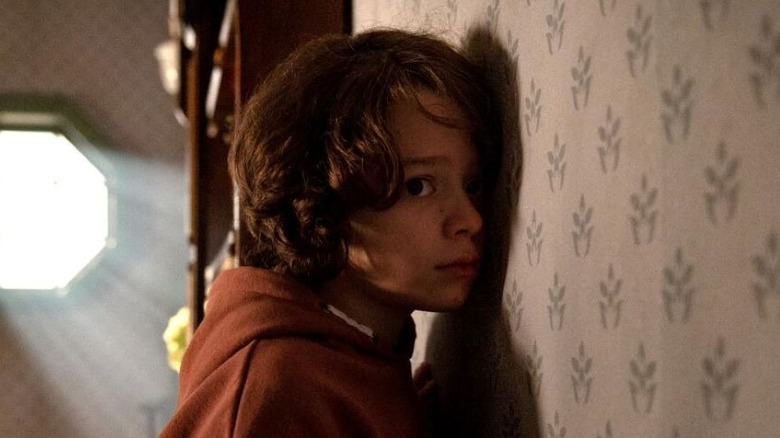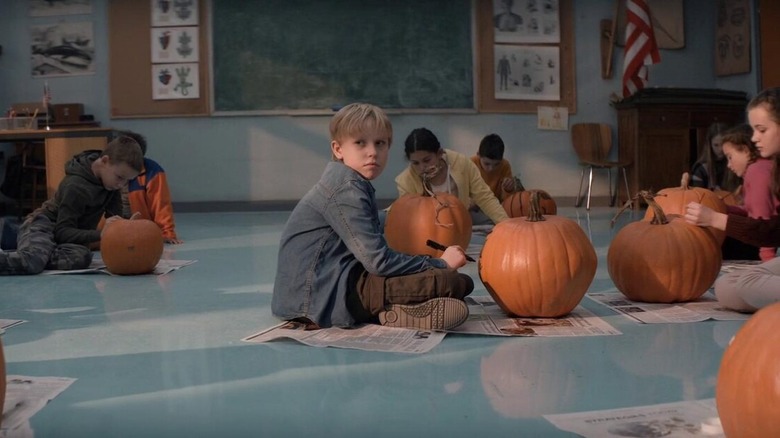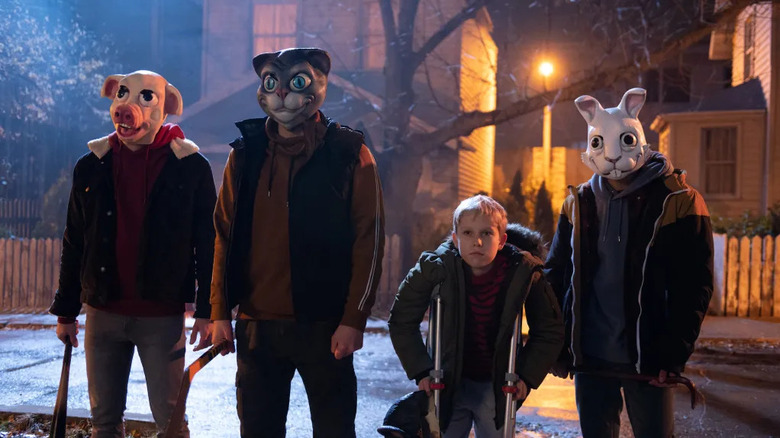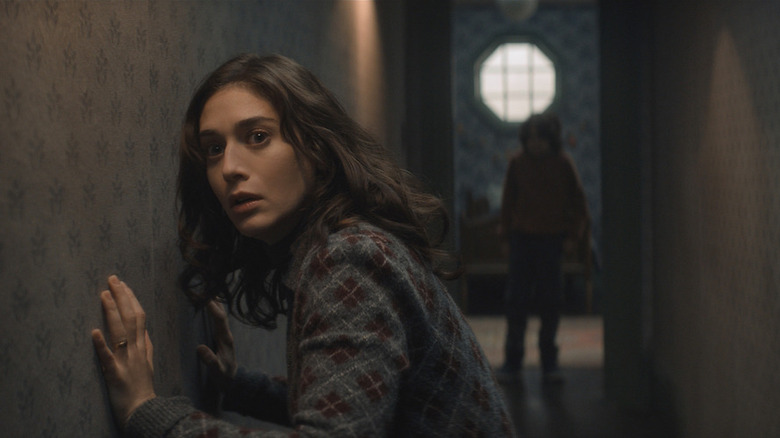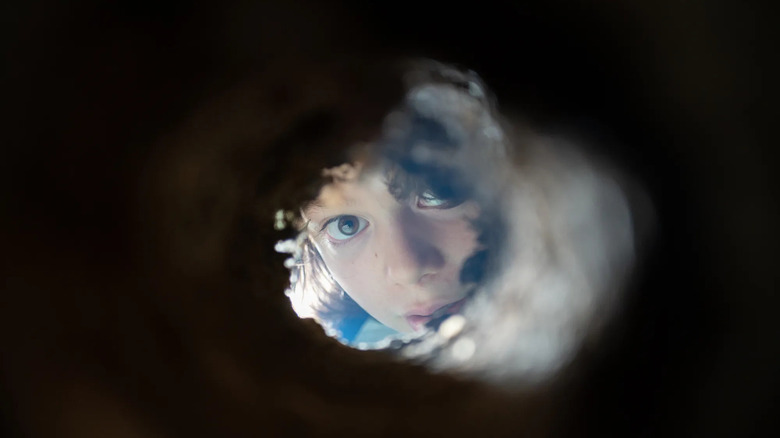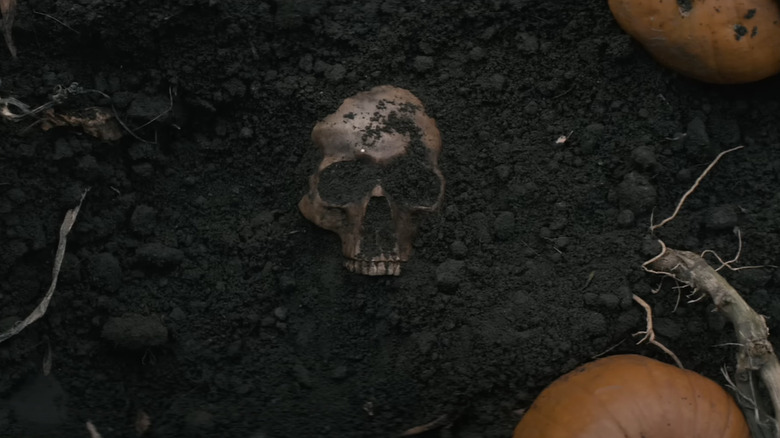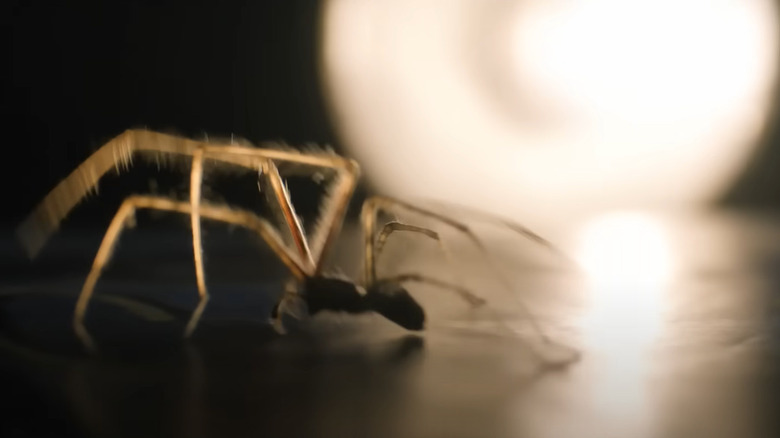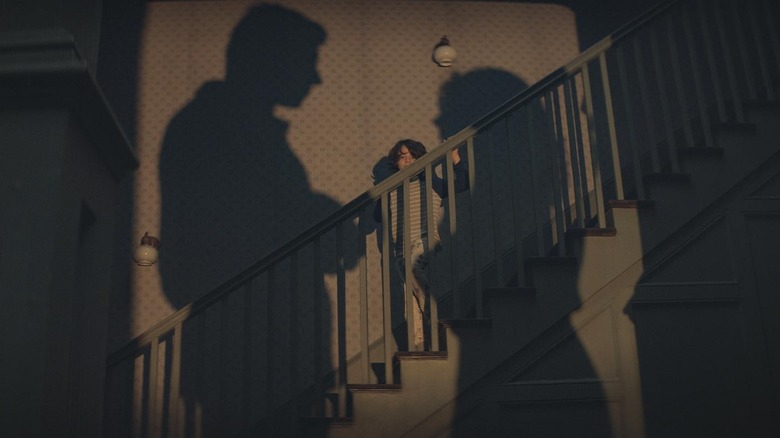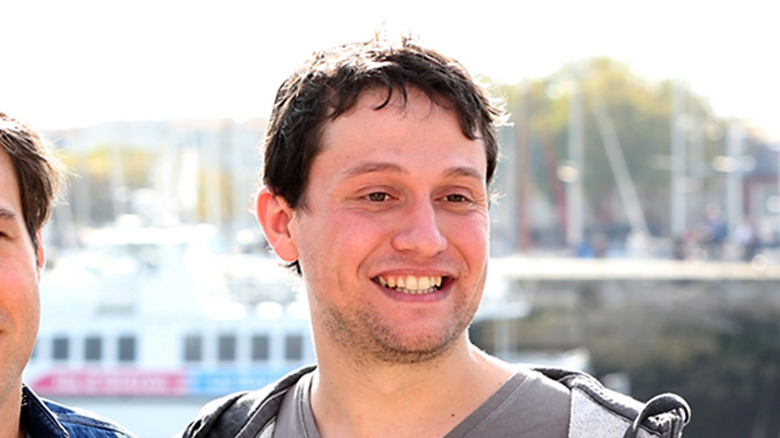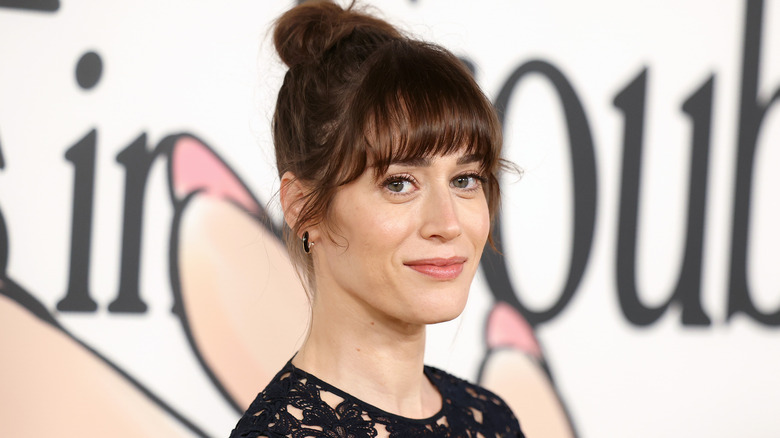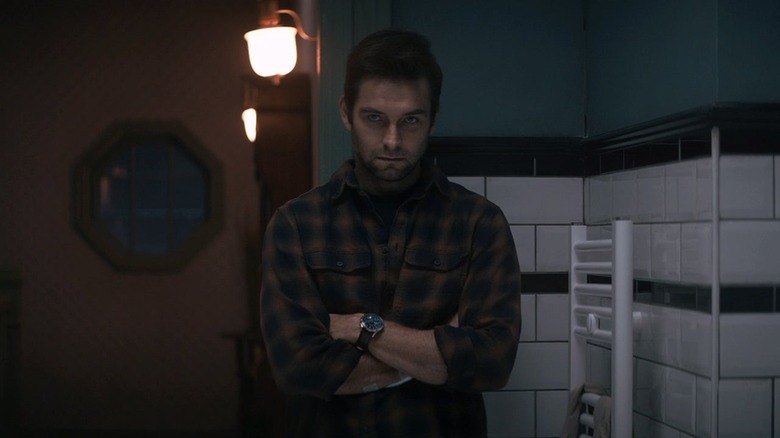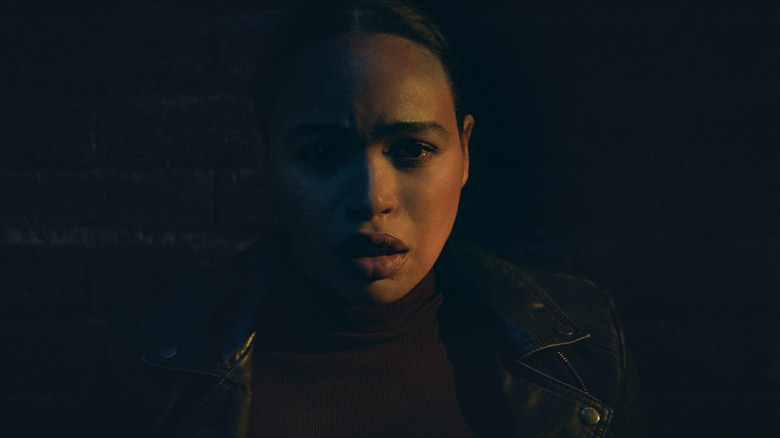The Ending Of Cobweb Explained
Contains spoilers for "Cobweb"
With a limited release at the tail end of summer and arriving on Hulu just in time for Halloween, "Cobweb" is an underrated horror flick that's perfect for spooky season. A debut feature film outing for director Samuel Bodin, it's not the first time the French filmmaker has dabbled in the horror genre, previously helming the 2019 Netflix series "Marianne." This time around, he's spun a story of a young boy with troubles both at home and in the classroom, who quickly discovers that not all is as it seems.
By the time it's wrapped up, "Cobweb" seems to be pretty straightforward with an easy-to-understand — albeit not totally conclusive — ending. Just below the surface, however, there are some different ideas and interpretations that make it a much more complex story than you might have thought. Beyond just unraveling all the juicy details of the plot, we'll also be looking at some of the film's deeper symbolism, what critics thought the memorable final act, and what Bodin has had to say about his directorial debut. Here's the ending of "Cobweb" explained.
What you need to remember about the plot of Cobweb
Set in the days leading up to Halloween, "Cobweb" follows 8-year-old Peter (Woody Norman), a young boy struggling with bullies at school who is further troubled by a mysterious voice coming from his walls at night. Though his fears are dismissed by his parents Mark (Antony Starr) and Carol (Lizzy Caplan) as the result of an overactive imagination, it quickly becomes clear that whatever is behind the bedroom wall is very real. It has a tremendous influence on Peter's life as well, first landing him into trouble when he draws a disturbing picture at school, and later leading him to get expelled after the voice talks him into getting violent revenge on his bully, Brian (Luke Busey).
In a major twist, however, Peter learns that — despite its terrifying nature — the voice he's been hearing may not be the true villain at play. Instead, it leads Peter to believe that his parents are the evil ones, responsible for the disappearance and death of a trick-or-treater years earlier, and sealing the voice — revealed to be Peter's sister — behind the walls. Amid the chaos, the only adult who seems to understand Peter's situation is his substitute teacher Miss Devine (Cleopatra Coleman). However, she struggles to help him thanks to his controlling and mysterious parents. It all boils over when Peter's sister convinces him that the only way for both of them to survive is for Peter to kill their parents before they do the same to him.
What happened at the end of Cobweb?
In the final act of "Cobweb," Peter poisons his parents on Halloween night and successfully frees the girl from the walls, only to come face to face with the grim truth. Contrary to the story she spun of being an innocent victim, the girl is a murderous monster who is ready to unleash years of pent-up rage onto Peter and anyone else in her path. Meanwhile, school bully Brian arrives with reinforcements at Peter's home, ready to get his revenge — only for him and his masked gang to find whatever it is that Peter has released from the walls.
What follows is a bloody and chaotic final act, as Peter's sister — who we soon come to know as Sarah (Aleksandra Dragova) — stalks and brutally murders the home intruders while taunting Peter. Meanwhile, Miss Devine decides to take matters into her own hands and arrives at the home, walking in to discover a massacre has taken place with Peter the sole survivor. After a narrowly missed escape attempt, the two confront Sarah in a makeshift prison her parents built, managing to seal her away again but falling short of killing her.
What the ending of Cobweb means
Going back to Peter's risky decision to murder his parents, some viewers may have missed how he pulled it off. Much earlier, after Peter's first encounter with the voice in the walls, his father Mark spreads rat poison — with the distinct scent of cinnamon — around the house under the false belief that the pests are the cause of the knocking noise. Fast forward to Halloween night, and that same scent of cinnamon winds up in the family's soup, giving us a clue that Peter spiked the food with rat poison, ultimately leading to his parents' grisly demise.
Later on, after she's released from the confines of the pit — and before being locked back into it by Peter and Miss Devine — the girl in the walls gives us her version of what happened over the years. Revealed to be Peter's twin sister — whose real name of Sarah we discover thanks to a stuffed animal in the hole — she was rejected and promptly locked away from the world at birth by her parents, who were horrified by her disturbing appearance. While imprisoned, she learned how to crawl, bite, and eventually speak to Peter, before finally manipulating him into releasing her so she could have her revenge. But was this version of Sarah's life the truth?
Another explanation for who Sarah is
Admittedly, giving a truly solid answer for who or what Sarah is isn't easy, as "Cobweb" keeps her true origin and powers debatable until the very end. Given that Peter is only told the "truth" by Sarah herself — who is likely an unreliable source — he's probably not being told the whole story. With that in mind, it's possible that instead of being simply deformed at birth — thus becoming the target of her parent's unwarranted hatred and rejection — Sarah may have been something far more malicious and paranormal from the very beginning.
It's important to remember that one of the driving forces behind Peter's decision to poison his parents is his desire to free his sister from the walls. Just moments before he does so, he's told to move the heavy grandfather clock and then turn the key on a small door that contains Sarah. Later, after she betrays Peter, he's sealed behind the same walls and locked door, which proves to be too much for him to escape from. But when Miss Devine arrives to save him, she manages to break down the walls imprisoning him with relative ease, suggesting that despite her enormous strength, Sarah still needed Peter to be the one to release her. While it's never explicitly stated, this raises the question of whether some supernatural seal kept her bound in the walls, with her brother being the only one who could set her free.
What really happened to the missing girl?
Throughout "Cobweb," references are made to the disappearance of a child in the neighborhood years earlier. It's used by Mark and Carol as justification to keep Peter from celebrating Halloween and later brought up by a school official to justify their strange behavior to a skeptical Miss Devine. As we eventually learn, however, Peter's parents were far more involved in her disappearance than we've been led to believe.
As revealed to Peter during one of his late-night talks with Sarah, the disappearance took place on a Halloween night years earlier. Already trapped in the house, Sarah allegedly cried out to a trick-or-treater for help, leaving Peter's parents with no choice but to murder her to keep their secret safe. The story is seemingly confirmed after she tells Peter the exact location the girl was buried in the backyard, which he grimly confirms after unearthing her skull. However, when we remember Sarah is not entirely trustworthy, it's also possible she was the one who killed the missing girl, leaving her parents with no choice but to cover up the grisly death in an act of desperation.
What was the symbolism of the spiders?
Beyond just providing some fitting imagery for this Halloween-set movie, spiders and the webs they spin are an integral part of "Cobweb," and not just because of the film's name. On a literal level, the imprisonment and neglect that Sarah has been forced to endure for years has left her with long unkempt hair that provides a perfect home for the arachnids and their webs. While that's certainly enough of a spooky image to name a film after, there's a bit more to it than that.
On a more symbolic note, the frequent imagery and references to spiders can be viewed as something of a metaphor for the situation that Peter and Sarah find themselves in. Though one is good and the other evil, they are both effectively trapped in a web of their parent's lies and control, and one that seems destined to kill them both if they remain trapped in it long enough. And for fans of the less obvious methods of storytelling in "Cobweb," the spiders aren't the only aspect we'll be looking at.
How Peter's perspective adds to the horror of Cobweb
"Cobweb" makes use of a changing visual style that, while hard to miss, may not have had an obvious meaning to some fans. Looking back at some of the earliest exterior shots of Peter's house in the film, it's shown to be a relatively modest family home, and certainly not the sprawling property that later scenes of its interior would suggest. But instead of that inconsistency being the result of lazy or careless filmmaking, there's a case to be made for it instead being a conscious choice by the team behind "Cobweb," and it involves taking a look at two of the film's more memorable scenes.
First, when Miss Devine returns to drop off Peter's last test following his expulsion, she has a tense conversation in the kitchen with the boy's parents. It's a cramped, uncomfortable scene that Peter is notably absent from, still grounded and sealed in the family's basement. Later, on the fateful night when Peter is waiting for his parents to eat their poisoned dinner, "Cobweb" shows us the same kitchen, but this time it appears much larger, reflecting Peter's childlike perception of the world around him. Director Samuel Bodin said in an interview with Cinema Scholars: "All the stairs are too big because we wanted to have that feeling. When you are a kid, things are bigger. So we built that a little bit too big."
What has director Samuel Bodin said about the film?
In an interview with the website Filmhounds shortly after the film's theatrical release, the director opened up about how his connection to Halloween (or lack thereof) influenced the final product: "I'm French, so I don't have the same relationship with Halloween that the U.S. or other places have. It came to me during my childhood and with movies and literature. In France, we are not doing Halloween in a big way. Then, suddenly, I had the opportunity to make a little Halloween film so I embraced that a lot. When I read the script and it said there's a little pumpkin patch in the backyard, I said 'Okay, let's do an ocean of pumpkins.' So I embraced it. And it really gives colour to the movie."
In a separate interview with Borrowing Tape, Bodin was asked about whether he subscribed to the classic trope of keeping a movie's monster mysterious until the very end: "I totally believe in that. Yeah, absolutely. You know, I am Team 'Jaws' totally, I can say that is the best way ... I wanted to show very, very few of that thing. I want to create something that can feel a presence without seeing ... I really think that the more you can imagine stuff, the more scarier you will be."
What has the cast said about Cobweb?
Bodin wasn't the only one to open up about their time filming "Cobweb," with stars Woody Norman and Lizzy Caplan discussing what it was like to play Peter and Carol respectively. In an interview with Bloody Disgusting, Norman talked about how he got into the role of Peter: "I think the way I did it was I let myself almost find out as Peter was finding out, by stopping myself from thinking about it. So, in the beginning, I made sure I only thought about the parent characters as parent characters. But when I was doing maybe a scene of complete distrust, I wouldn't think of the parent characters as parents. I'd think of them as villains, just to stop myself from humanizing them in a way and make me more scared of them as well."
In an interview with Screen Rant, Caplan was asked how she got into character for Carol, and how that performance meshed with co-star Antony Starr's Mark: "The main objective for Antony and I was to make it as odd as possible between these two people in this family dynamic, and we wanted to find the unsettling beats within that. With every take, it got weirder and weirder, and they would let us kind of just go with it and improv. From take, like, four onward, the takes were so weird. We were just trying to do the strangest stuff."
What have critics said about the ending of Cobweb?
Unlike Samuel Bodin's last foray into horror with 2019's "Marianne," "Cobweb" was much more of a mixed bag when it came to the opinions of critics. Some, such as the positive review from Empire reviewer Ben Travis, highlighted the film's memorable climax as a high point: "Once the truth emerges, debut director Samuel Bodin controls the chaos admirably, leaning into the joyous absurdity of the reveal. He shoots the film with real style, displaying a great control of light and shadow."
Other reviewers weren't as kind, including Monica Castillo of RogerEbert.com, who felt the film failed to deliver any scares until the end: "While the strange and unusual world of Samuel Bodin's 'Cobweb' has ample enough unsettling energy thanks to Philip Lozano's ominous cinematography, it fails to reach its scary ambitions. Jump scares feel less jumpy, and the twists are predictable. It's a subtle creeper, but that's about it ... all ambiance and little substance — like a pot of water that never seems to boil."
Will we ever see a sequel?
"Cobweb" ends on an eerie final scene in which Peter's sister, despite being sealed away, assures him that as long as she's alive, she'll always be a part of him, stalking him from the shadows. With such an open ending, it's natural to wonder whether or not Samuel Bodin is looking to continue the story told in his directorial debut, a prospect he's already put some thought into. He told Radio Times: "For my path, as a director, I really took the story as a standalone ... But I'm sure ... you know, you always say that, and suddenly someone has a great idea." He went on to add, "And if the idea is great, there is a story ... it's the right thing to go, 'Okay, now we have something else to tell. So, you know, let's do it.'"
If we do see a sequel to "Cobweb," though, the film's star Woody Norman may need some convincing. During an interview with Movieweb, after being asked if he'd come back to continue the story, he stated, "I'm not sure because I think this film has a cliffhanger; it doesn't really have an 'ending.' It would almost ruin the magic of the film, when audiences should go home and wonder [where] I ended up." One way or another, the pieces are certainly in place for a sequel, so only time will tell whether we see Bodin revisit "Cobweb" in his budding career as a filmmaker.
